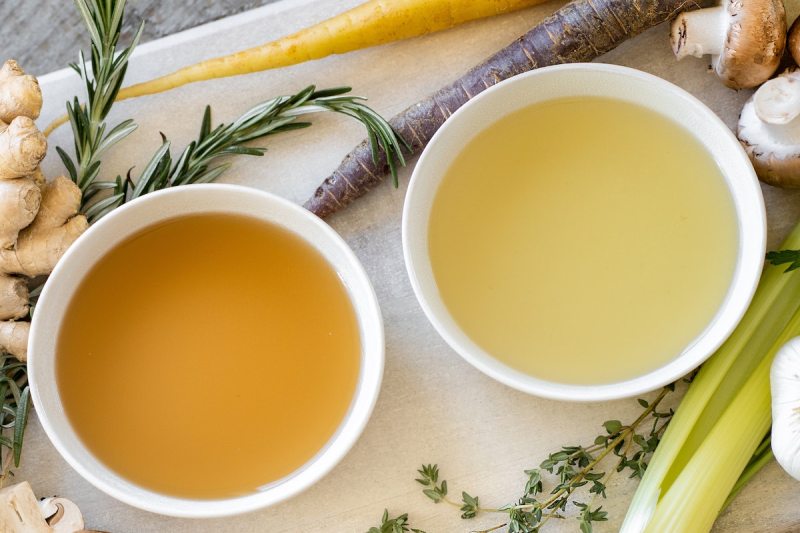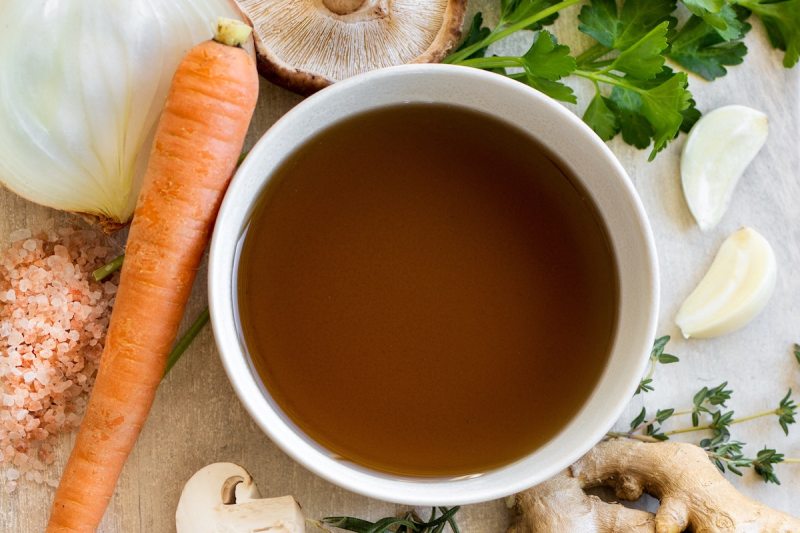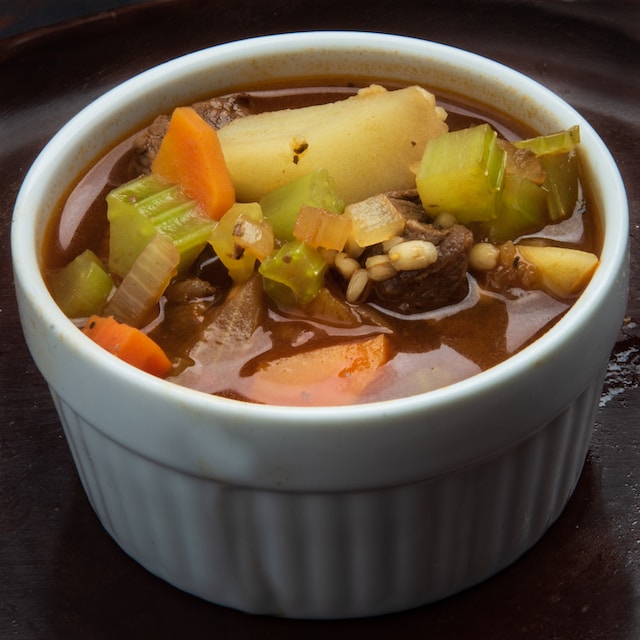
Every few years, there’s a wellness trend that seems to take over like wildfire, spreading from niche health markets to mainstream culture. From granola to the vegan diet, Epsom salt baths to apple cider vinegar, we are always on the quest for natural solutions to help us feel better, look younger, sleep more soundly, and so on. A few years ago, bone broth entered the scene as a nutritional superfood with purported benefits spanning the gamut from making skin look younger to burning body fat.
It was heralded by Paleo dieters, ancestral health advocates, and CrossFit enthusiasts, and soon conventional food brands and big box stores started making and stocking bone broths, and boutique bone broth cafes opened in major cities around the country, where they exclusively offered gourmet bone broths as soups, drinks, and shots.
Though the clamor surrounding bone broth has quieted from a roaring boil to a more tempered simmer, it’s still a touted health elixir favorite of many athletes and wellness fans. Whether you have yet to sip your first cup of bone broth or it’s been a while since you added it to your grocery list and you’re wondering if bone broth lives up to the hype, keep reading to learn more about the benefits of bone broth.

What is bone broth?
Although it may be a somewhat recent fad, bone broth has actually been prepared and consumed for thousands of years. Bone broth is a nutritious stock made by simmering the bones of animals such as cows, chickens, fish, pigs, bison, and turkeys, along with spices, herbs, and vegetables. Animal hooves, tendons, beaks, and other connective tissues may also be used. The extensive simmering process brings out the minerals, amino acids, vitamins, and healthy fats stored in the bones and connective tissues, creating a nutrient-dense broth. Bone broth may be used as a stock for other soups, consumed as a liquid broth as is, or turned into a health drink.
What nutrients does bone broth provide?
It’s hard to imagine that simmered animal bones would provide much of anything in terms of nutrients, but bones are storage houses for various vitamins and minerals, and connective tissues store proteins and fats. The extended boiling softens the bones and cartilage and releases the nutrients within. The exact nutritional profile of any given cup of bone broth depends on the specific ingredients used, but the basic bone broth recipe yields the following nutrients:
- Bones: The bones provide minerals such as calcium, phosphorus, magnesium, potassium, and sulfur.
- Bone marrow: Bone marrow provides vitamin A, vitamin K2, omega-3 fatty acids, iron, zinc, selenium, boron, manganese, and conjugated linoleic acid.
- Connective tissue: Cartilage and sinew provide glucosamine, chondroitin, and glycine, along with protein and collagen.

These are some of the health benefits of bone broth
Bone broth can increase your own collagen production
Collagen is the most abundant protein in the body, composing aspects of everything from bones and teeth to muscles, tendons, skin, and corneas. Collagen is synthesized in the body by combining proline and glycine, two amino acids. Proline is found in foods like eggs and dairy products, but glycine isn’t as readily consumed in high concentrations in many people’s diets because it’s most concentrated in animal skin (pork skin, chicken skin, etc.) or gelatinous connective tissues.
It’s these very connective tissues that are stewed to make bone broth, making bone broth a rich source of this key component of manufacturing collagen. By consuming bone broth, you not only directly feed your body collagen, but you also supply a bountiful source of the building blocks for your body’s own production of more collagen.
Bone broth may strengthen your bones
Depending on the types of animal bones used, most bone broths contain minerals needed for our own bone health, such as calcium, phosphorus, magnesium, and potassium, and, in the case of fish bones, iodine, which is crucial for thyroid function. Collagen also has been shown to increase bone density, as collagen forms a structural component of bones as well.
Bone broth can improve joint health
Cartilage, sinew, and other connective tissues used in bone broth contain glucosamine and chondroitin, two compounds found to strengthen joints, protect against arthritis, and relieve joint pain. Moreover, because bone broth contains proline, glycine, and collagen, it provides the necessary amino acids and building blocks for the body to repair and regenerate collagen found in joints, ligaments, cartilage, and tendons in and around joints.
Bone broth may improve the appearance of your skin
Because bone broth is rich in collagen and may help increase your body’s own collagen production, consuming bone broth may increase the elasticity of your skin and reduce the appearance of fine lines and wrinkles. This is due to the fact that collagen increases skin cell turnover and forms structural components of skin, helping keep your skin looking youthful and vibrant.
Bone broth can reduce inflammation
Chronic inflammation can lead to a variety of diseases, so adding anti-inflammatory foods to your diet can reduce your risk of certain diseases, such as obesity, inflammatory bowel disease, heart disease, and certain cancers. Bone broth is rich in glycine and arginine, two amino acids that have been shown to reduce inflammation by inhibiting the production of inflammatory factors and improving the integrity of the mucosal barrier of the gut.
Bone broth can enhance workout recovery
Consuming bone broth as part of your post-workout fueling may help you recover faster and feel less sore after you exercise. Bone broth contains amino acids that can help support muscle protein synthesis and the repair and regeneration process after a hard workout.
Bone broth may help you sleep
In addition to forming a building block of collagen, the amino acid glycine has been found to promote restful sleep. Research has demonstrated that like tryptophan and melatonin, consuming glycine before bed helps people fall asleep faster, wake up fewer times in the night, and stay in deeper states of sleep for longer periods of time.
Bone broth improves gut health
Bone broth contains high amounts of the amino acid glutamine, which has been shown to improve the function of your gut lining and reduce oxidative damage in the gut. It can also improve intestinal function by increasing the height and density of villi (the absorptive structures that line the intestines) and stimulating the production of digestive enzymes. As a result, bone broth may aid the digestion and absorption of nutrients while simultaneously reducing inflammation in your gut.
Bone broth can support weight loss
Even though bone broth is low in calories, it’s surprisingly filling and satisfying. The amino acids and healthy fats help nourish you, and if you sip it slowly, you may consume fewer calories in a meal or delay mindless snacking.

How to work bone broth into your diet
There are a few ways to work bone broth into your diet, so you can get the health benefits from it. Drinking it straight is the simplest way to enjoy bone broth. Heat it up on the stove or in the microwave and sip it warm. You can add a squeeze of lemon, some fresh herbs, or a splash of vinegar for extra flavor.
Use it in soups and stews to add a rich, savory flavor to these meals. Use it as the base for any recipe, or simply add a cup or two to your existing favorites. You can also use bone broth to make a delicious and nutritious gravy. Whisk some flour into hot bone broth and cook until thickened. Add flavorings like herbs, spices, or wine to make it more tasty.



